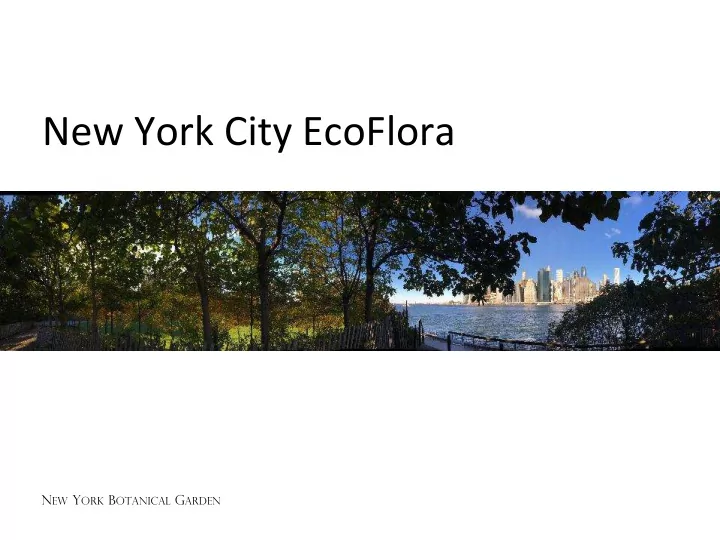

New York City EcoFlora N EW Y ORK B OTANICAL G ARDEN
What is an EcoFlora? • Flora – List of all plant occurring spontaneously in a location Cody Hough • Ecology – Study of interactions between all organisms and their environment John Flannery N EW Y ORK B OTANICAL G ARDEN
Plant blindness • Bias towards animals – Education – Policy – Knowledge – Awareness • Plants in background • Effect on policy decisions
Charismatic megafauna Charismatic flora? Wikimedia Commons
Goals of the NYC EcoFlora • Create list of plant species in NYC • Better understand role of plants in NYC ecosystems • Raise awareness and interest • Engage the community • Have fun!
Goals for the Pilot Year • Test volunteer • Gather data on… – 30 test species protocols for…. – Their associates – Engagement • Pollinators – Entertainment • Herbivores – Validity • Parasites – Repeatability • Seed dispersers – Accuracy – Their habitat • Narrow down list of – Their phenology observable traits to what really matters
Ecological and Botanical Questions Observer status Scale Identification tool used Population size (number) Change in habitat Population size (area) Slope Habitat type Aspect Distance to nearest tree Number of nearby species Plant associations Animal sign Health of plant Plant traits for ID'ing Leaf litter Anomalous plants Cryptogams Disease presence Bare soil Substrate (concrete, forest floor, etc) Moisture content of soil Weather Canopy cover Disturbance measure Site condition Insect interaction Egg/larva presence Soil condition (color) Time spent observing Soil condition (firmness)
Goals for this year • We will create • We will learn – Protocols for data- – What is compelling – What to expect going gathering – Usable city-wide citywide – Understandable for all – How we can advance New Yorkers our goals • We will expand • We will focus on 30 – Knowledge of plants common species • Locations • Associations • Interactions
Volunteer Role • Gather data • 3 hour shifts – Using iNaturalist • 1x a week – Taking notes • Will work in small • Adjust to changing groups formats/objectives • Hoping for commitment • Provide feedback through the summer, • Learn options for fall/winter • Have fun! involvement • There will be indoor opportunities
Our support to you • I’m on -site during data- gathering • Identification support • Regular updates on our progress • Producing species guides • Help with photo and technical details
Usual Volunteer Day • Welcome and plan for the day (10 – 20 min) • Observe! (60 - 80 min) • Break (15 min) • Possible interpretive talks Observe! (60 min) • Gather feedback (15 min) • End of 3-hour period
For today • Learn about iNaturalist • Volunteer forms • Sign up for timeslots – Aiming to max at 15 per timeslot • We’ll answer your questions!
Recommend
More recommend